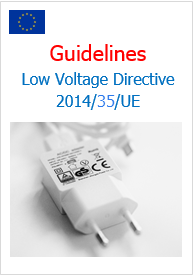// Documenti disponibili n: 46.535
// Documenti scaricati n: 36.552.390
ID 8131 | 08.04.2019
Le calzature di protezione per i lavori sotto tensione, devono rispondere ai requisiti della norma CEI EN 50321-1:2019 armonizzata Regolamento (UE) 2016/425 "DPI".
Il Documento ne illustra la Classificazione elettrica, codice colore, marcatura, requisiti con estratti dalla CEI EN 50321-1:2019.
Gli stivali o le scarpe isolanti proteggono l'utilizzatore contro le scosse elettriche impedendo il passaggio di corrente pericolosa attraverso i piedi.
Questi DPI devono soddisfare la norma EN 50321 che prevede classi di protezione e prove dielettriche sulla calzatura completa.
Esistono anche sopra-calzature (da indossare sopra le calzature da lavoro) che soddisfano la norma.
Esempio sopra-calzature
CEI EN 50321-1 (CEI 78-20) 2018: Lavori sotto tensione - Calzature di protezione
La norma specifica i requisiti e le prove per i dispositivi di protezione individuale utilizzati come calzature e sovrastivali isolanti per la protezione da elettrocuzione nei lavori sotto tensione o in prossimità di parti attive di impianti fino a 36 000 V in corrente alternata o 25 000 V in corrente continua.
I dispositivi progettati e fabbricati nel rispetto della presente norma contribuiscono alla sicurezza degli utilizzatori a condizione che siano impiegati da personale qualificato, in conformità con i metodi di lavoro in sicurezza e le relative istruzioni per l'uso.
Le calzature antistatiche, resistenti agli shock elettrici e conduttive non sono coperte da questa Norma.
La Norma in oggetto sostituisce completamente la Norma CEI EN 50321:2000-04, che rimane applicabile fino al 12-01-2021. Questa Norma viene pubblicata dal CEI in una prima fase nella sola lingua inglese, per consentirne l'immediato utilizzo da parte degli utenti interessati, nel rispetto della data di pubblicazione fissata dagli Enti Normatori internazionali.
Successivamente il CEI pubblicherà, in un nuovo fascicolo, la versione solo italiana; tale versione avrà la stessa validità della presente.
...
Excursus
Estratto CEI EN 50321-1 (CEI 78-20) 2018 (EN)
4 Requirements
4.1 Electrical classification
Electrical insulating footwear and overboots shall be classified by electrical classes, acc ording to their use on or near electrical installations of a defined nominal voltage,
as follows:
- Electrical class 00, for installations with nominal voltage up to 500 V AC or 750 V DC;
- Electrical class 0, for installations with nominal voltage up to 1 000 V AC or 1 500 V DC;
- Electrical class 1, for installations with nominal voltage up to 7 500 V AC or 11 250 V DC;
- Electrical class 2, for installations with nominal voltage up to 17 000 V AC or 25 500 V DC;
- Electrical class 3, for installations with nominal voltage up to 26 500 V AC;
- Electrical class 4, for installations with nominal voltage up to 36 000 V AC;
Guidance to the use of electrical insulating footwear and overbootsn is given in Annex
4.4 Marking
4.4.1 The electrical insulating footwear and overboots shall be first marked according to Clause 7 of EN ISO 20345:2011 or Clause 7 of EN ISO 20347:2012 or Clause 7 of EN ISO 20346:2014
Additional marking to comply with this standard shall be the following:
Each electrical insulating footwear or overboots which claims to comply with the requirements of this standard, shall bear a label and/or marking giving the following information:
- symbol IEC 60417-5216:2002-10 - Suitable for live working; double triangle (see Annex B);
NOTE The exact ratio of the height of the figure to the base of the triangle is 1,43. For the purpose of convenience,this ratio can be between the values of 1,4 and 1,5.
- number of EN 50321:201X standard immediately adjacent to thesymbol;
- electrical class;
- voltage current tested “AC” or “AC/DC” according to voltage testing applied.
...
4.4.2 If a colour code is used, the symbol (double triangle) shall correspond to the following:
Annex B (normative) Suitable for live working; double triangle
(IEC-60417-5216:2002-10)
Annex ZZ (informative)
Relationship between this European Standard and the essential requirements of Regulation 425/2016/EEC aimed to be covered
This European Standard has been prepared under a Commission’s standardization request to provide one voluntary means of conforming to essential requirements of Regulation 425/2016/EEC on personal protective equipment. Once this standard is cited in the Official Journal of the European Union under that Regulation, compliance with the normative clauses of this standard given in Table ZZ.1 confers, within the limits of the scope of this standard, a presumption of conformity with the corresponding essential requirements of that Directive and associated EFTA regulations.
Table ZZ.1 - Correspondence between this European Standard and Annex II of the Regulation 425/2016/EEC Personal Protective Equipment
...segue in allegato
Certifico Srl - IT | Rev. 0.0 2019
©Copia autorizzata Abbonati
Fonte: CEI EN 50321-1: Lavori sotto tensione - Calzature di protezione
Collegati:

EU, 29 Aprile 2020
MDCG 2020-9 Regulatory requirements for ventilators and related accessories Medical Device Directive 93/42/CEE.
The World Health Orga...

Paletto antinfortunistico - Dispositivo di ancoraggio
EN 795 Documentazione Tecnica
- Valutazione dei Rischi e modalità d'uso
- Analisi della norma UNI EN 795
- Atte...

Guidelines Low Voltage Directive 2014/35/UE - Draft
Le linee guida Direttiva 2014/35/UE Bassa Tensione sono destinate ad esser...
Testata editoriale iscritta al n. 22/2024 del registro periodici della cancelleria del Tribunale di Perugia in data 19.11.2024